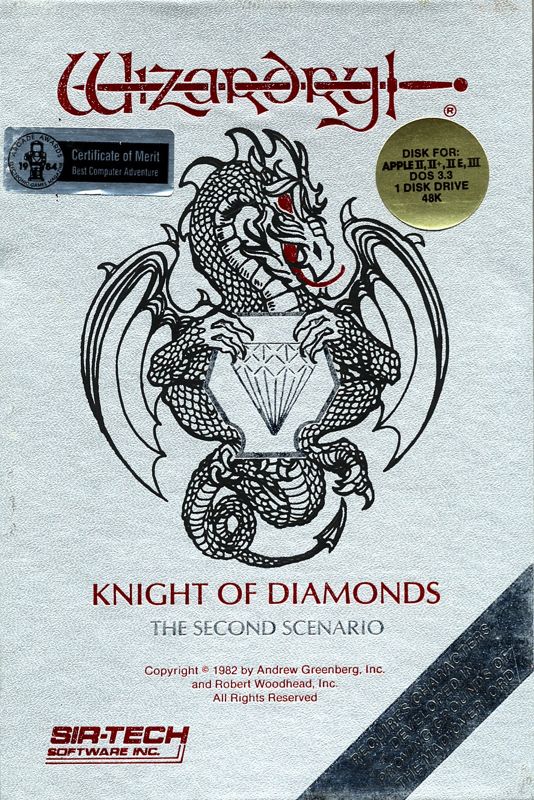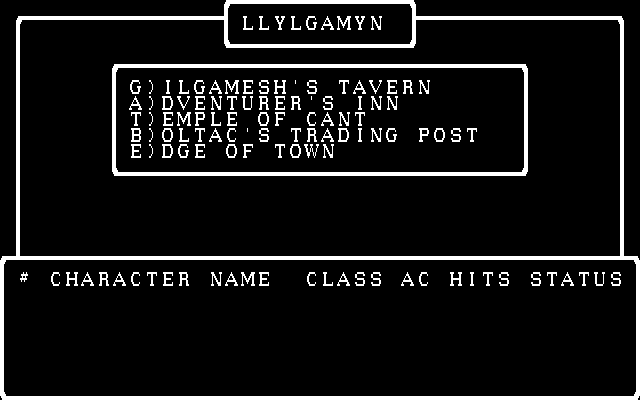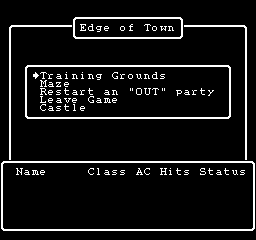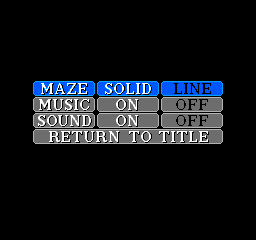Retro Replay Review
Gameplay
Wizardry: Knight of Diamonds – The Second Scenario picks up precisely where the original Proving Grounds left off, making character import and continuity a core pillar of its design. Rather than crafting a brand-new party, veterans of the first adventure will slide their seasoned heroes straight into a fresh gauntlet. This emphasis on progression adds immediate depth: players aren’t starting from zero, but instead must leverage hard-won levels, spells, and gear to tackle even tougher encounters.
(HEY YOU!! We hope you enjoy! We try not to run ads. So basically, this is a very expensive hobby running this site. Please consider joining us for updates, forums, and more. Network w/ us to make some cash or friends while retro gaming, and you can win some free retro games for posting. Okay, carry on 👍)
At its heart, the game remains a classic first-person, turn-based dungeon crawler. You’ll navigate a six-level 3D wireframe temple, hunting for the Staff of Gnilda to save the kingdom. Combat unfolds through a straightforward menu: select spells, weapons, or items, then watch as your choices play out in text and simple animations. Random encounters are frequent, and machine-rolled battles can quickly overwhelm unprepared parties—encouraging careful resource management and tactical retreats.
Mapping each floor with pencil and graph paper is almost a rite of passage. Hidden doors, secret passages, and looping corridors demand patience and attention to detail. While modern gamers may bristle at this manual approach, it contributes to a palpable sense of exploration and accomplishment once you finally chart that elusive shortcut or trap-filled hallway.
Graphics
By today’s standards, the wireframe visuals of Knight of Diamonds are eminently dated, but they delivered an immersive 3D feel back in the 1980s. Walls, doorways, and staircases are drawn with simple lines against a black backdrop, relying on your imagination to flesh out the dank corridors. This minimalism keeps the focus squarely on discovery, where every unlit corner might hide treasure or a deadly ambush.
Character portraits and monster illustrations appear sparingly—mostly to punctuate combat results or announce boss encounters. While these static images lack polish compared to later console RPGs, they possess a certain charm and clarity, instantly conveying whether your party faces a goblin horde or the dreaded Temple Guardian.
Sound design is equally modest: bleeps and bloops that signal actions and hits, plus occasional musical stings when leveling up or finding a rare item. Although nothing you’d call cinematic, these cues reinforce the old-school atmosphere and keep you engaged in the dungeon’s rhythmic ebb and flow.
Story
The narrative picks up after the tragic end of the mad king Trebor and the villainous Werdna. A new tyrant, Davalpus, has slaughtered the royal family and seized power—only to be slain by the heroic prince wielding the legendary Staff of Gnilda. With the artifact now hidden deep within Gnilda’s temple, players must recover it to restore peace and defend Llylgamyn from foreign invaders.
Although the storyline is relatively straightforward, it serves as an effective backdrop for dungeon crawling. Conversations with townsfolk and intermittent text updates add flavor, teasing hidden lore about ancient gods and unspeakable curses. Your party’s legend grows page by page, making each new floor feel like the next chapter in an epic saga rather than a series of isolated battles.
As with many early RPGs, the emphasis is more on player-driven storytelling than on elaborate cutscenes or branching dialogue. The real narrative emerges from your party’s struggles—narrow escapes, close-call spells, and triumphant recoveries—imbuing the barebones plot with personal stakes and memorable moments.
Overall Experience
For fans of vintage role-playing games, Knight of Diamonds offers a pure, unfiltered dungeon crawl. The retention of your original party, combined with the steep difficulty curve, creates a deep sense of continuity and accomplishment. Success isn’t handed to you; it must be earned through strategy, mapping, and thorough exploration.
That said, newcomers should be prepared for archaic conventions: manual mapping, text-heavy menus, and frequent trial-and-error. Patience and perseverance are key. If you crave narrative depth with modern conveniences—or if you dislike grappling with paper-and-pencil mazes and punishing random encounters—you might find this sequel frustrating.
Ultimately, Wizardry: Knight of Diamonds – The Second Scenario stands as a testament to early expansion design, building directly on its predecessor’s engine and assets while offering a fresh set of challenges. Its blend of character import, intricate temple layouts, and survival-focused gameplay remains compelling for retro aficionados. If you’re ready to don the armor of the Knight of Diamonds and test your mettle against Gnilda’s temple, this classic awaits.
 Retro Replay Retro Replay gaming reviews, news, emulation, geek stuff and more!
Retro Replay Retro Replay gaming reviews, news, emulation, geek stuff and more!









Reviews
There are no reviews yet.